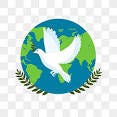On September 21, 2022, there was a public webinar debate on the proposition, “War Can Never Be Justified.” Arguing the affirmative was David Swanson, author, activist, journalist, and radio host; and executive director of World BEYOND War. He is a Nobel Peace Prize nominee, and U.S. Peace Prize recipient. Arguing the negative was Arnold August, a Montreal-based author of three books on US/Cuba/Latin America. His comments on geopolitical issues appear on TelesurTV and Press TV. He is a Contributing Editor for The Canada Files; and he is a member of the International Manifesto Group. The debate was moderated by Youri Smouter, host of 1+1, a topical history and current affairs program on YouTube; he is based in Southern Belgium.
David Swanson put forth a hypothetical case. Imagine that we are citizens of a social democratic country that is invaded by a totalitarian country. What can we do? What has the best chance for the best results, for discouraging future invasions? …



